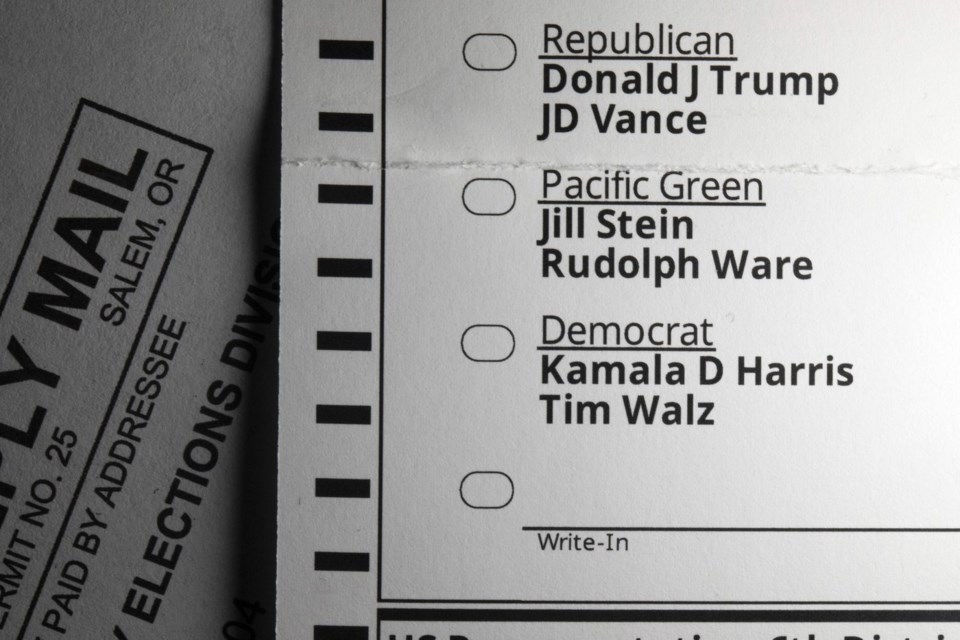WASHINGTON — It felt like his future was at stake when 18-year-old Carter Fay cast an early ballot in the United States election.
"The reality is that our democracy, I truly think, is on the line. And so do people in my generation," said Fay, who's from the battleground state of Georgia.
"To put it straight, we are scared."
Fay is among an estimated eight million generation-Z voters who can take part in a presidential election for the very first time. There's power behind this generation, which is angry at the current political system and worried about its future.
And the race to the White House still looks to be a dead heat.
Many young people were dismayed when it appeared the election would be a repeat of the 2020 matchup between President Joe Biden and former president Donald Trump.
Trump had been chipping away at the Democrats' hold on the youth vote, making inroads among young white men without college educations. He was also seeing some increasing support among young Black and Latino men.
Democrats were concerned younger voters who felt apathetic about two older candidates might not even show up to the polls.
There was a tumultuous turnaround after a disastrous presidential debate, and Biden removed his name from the Democrat ticket. Vice-President Kamala Harris catapulted into the candidacy boosted by a swell of memes, viral moments and the excitement of younger Americans.
Polls suggest young people are overwhelmingly supportive of Harris, with a ratio of around 60-40, said the University of Pennsylvania's Marc Trussler. But there is a significant gender divide.
"Young men are much more pro-Trump," said Trussler, director of data science for the university's program on opinion research and election studies.
"But even amongst young men, it's probably tied between Harris and Trump, maybe a little bit pro-Harris."
Evan, who attended a recent Trump rally in Pennsylvania, said it was his first time voting for president. The 20-year-old, who didn't give a last name, said he has been running a business since he was 12, and it's difficult under the current administration.
"Seeing the prices of stuff, inflation up-down, up-down," Evan said. "Now, it's like it's finally our turn to have money in this world, do the things we want, and … (we) can't afford nothing."
Trump has strategically tried to reach out to voters like Evan who are frustrated about their future prospects and concerned with what they call the "woke" culture of the left. He's appeared on "bro" podcasts like the wrestling-themed Six Feet Under, the sports-themed Bussin' with the Boys and "The Joe Rogan Experience."
His rallies have a vibe more akin to a monster truck rally than a political event. His celebrity support includes Kid Rock, Hulk Hogan and local rap artists from battleground states.
Trussler said he connects with first-time voters but also people who aren't traditionally interested in politics and cast a ballot infrequently.
"I think we've seen both candidates pursue strategies that wouldn't have been considered in previous elections," said Trussler, who is 91Ô´´.
Harris has also appeared on podcasts like "Call Her Daddy" and has celebrity support from Beyoncé and Taylor Swift. The vice-president and her team have been praised for their success on social media, where they connect to viral moments.
"The campaigns have appointed social media (people) to do these kinds of strategies," said Melissa Haussman, professor emeritus at Carleton University in Ottawa. "It doesn't just sort of organically grow."
Democrats are meeting first-time voters where they're at, Fay said. The University of Toronto student said his generation grew up on platforms like TikTok and Instagram. It's where they got into politics and activism.
"There hasn't really been a real way to see the things changed that we want changed," Fay said. "The fact that my generation now has this ability in gen Z to start to get out and actually vote is a really big deal."
Fay said many of his peers care about climate change, social justice, education and gun laws — things that affect their future.
"My generation has grown up having to go to school and actually fear for their lives," he said, pointing to the Apalachee High School shooting in September.
They also care about freedoms. Young women in his generation have fewer rights than the generation before, Fay added.
Polling also suggests peer influence could be a key factor in voter turnout.
A poll from the institute of politics at Harvard Kennedy School says 79 per cent of youth plan to vote if their friends are. Only 35 per cent plan to participate even if their friends don't.
That could prove critical, said Trussler. Generally, the turnout among young people is lower than other groups.
But about 55 percent of voters aged between 18 and 29 cast a ballot in 2020, a major increase from the previous election. They played a key role in Biden winning battleground states and taking the White House. If youth head to the polls in droves again, it could prove a boon for the Democrats on Nov. 5.
George Constantine, 20, said young Republicans are motivated and talking to their friends, too.
"If they love Trump, keep following Trump," Constantine said at the recent Trump rally in Pennsylvania.
"Don't let your friends, school, online tell you other things. What's best for your heart is what you think."
This report by The 91Ô´´ Press was first published Nov. 3, 2024.
Kelly Geraldine Malone, The 91Ô´´ Press



